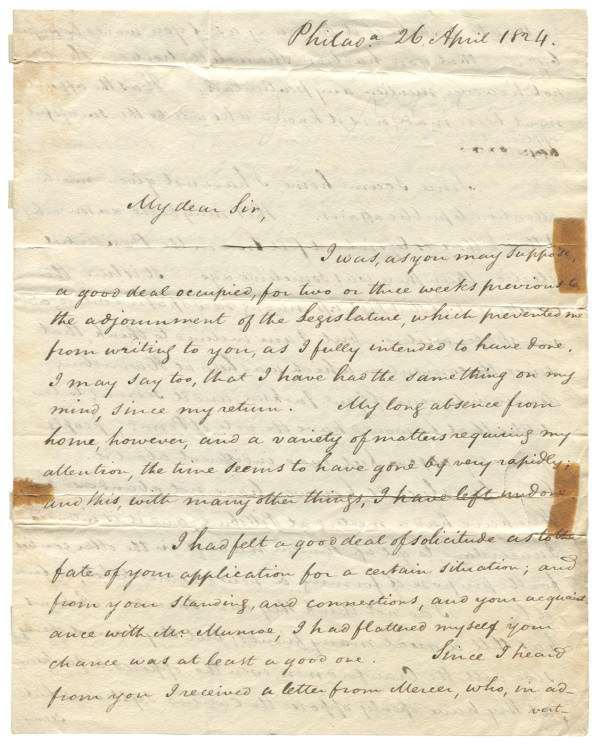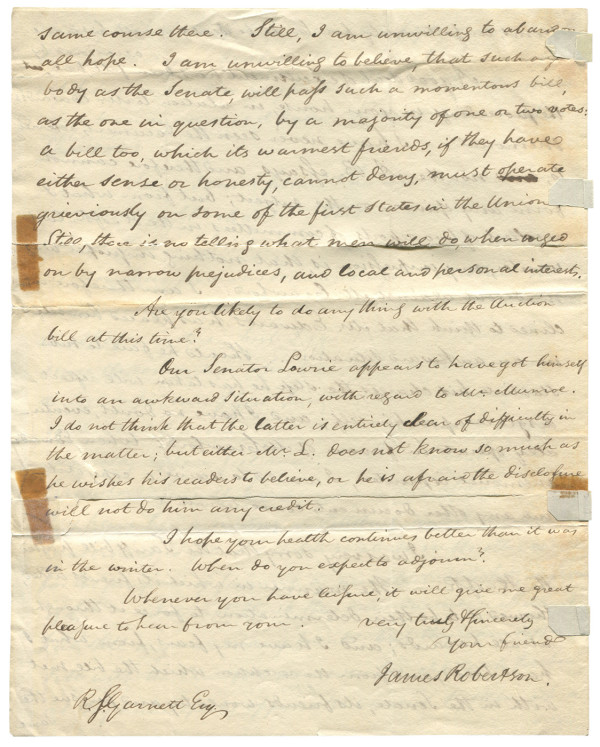
(Election of 1824) James ROBERTSON (c. 1780-1854) Federalist member of the Pennsylvania State Senate, representing the 1st District of Philadelphia from 1822 until his retirement in 1825. He was an officer for the Bank of the United States from the late 1820s until the bank’s dissolution in 1841.
Fine content Autograph Letter Signed “James Robertson” as a representative of the Pennsylvania State Senate, 4pp., 251 x 198 mm. (9 7/8 x 7 6/8 in.), Philadelphia, 26 April 1824, to Robert S. Garnett (1789 – 1840) of Essex County, Va. A chatty political letter to a member of the Congressional faction of the Democratic-Republicans backing Treasury Secretary William H. Crawford of Georgia for President commenting, among other things, on the growing factions growing around of Jackson, Adams and Crawford that would result in the only election ever thrown into the House of Representatives since the passage of the Twelfth Amendment. Robertson admits that since his arrival home from Harrisburg, “I have not given much attention to public affairs. This may be the reason why I think there is less interest felt here in the Presidential election, than there was some time ago. It is true, the excitement is still kept up among newspaper editions, and newspaper writers— but I am inclined to think that since the Convention which was held at Harrisburg, decided in favour of Genl. Jackson, and it seeming to be settled, that he would have the vote of Penna., people general appear feel more indifferent about it. Crawford’s friends, however, have not abandoned him. They have had a meeting at Pittsburg; and it is intended, I understand, to get up similar meetings in the other counties for the purpose of forming a new electoral ticket, in favour of C[rawford]. I do not think they can succeed. Adams has still a great many friends; but they cannot openly side with the Crawford men, even tho’ opposed to Jackson, as they have openly opposed the caucus system, which seem unfortunately for C[rawford] to be identified with his name…” Crawford’s supporters in Congress made a fatal blunder for his candidacy when they staged a Congressional caucus to nominate him for President. Out of 216 Democratic-Republican members of Congress, only sixty-six attended, giving the meeting the appearance of factional meeting without the official sanction of the party, hobbling Crawford’s nomination for President (together with his old friend Albert Gallatin for Vice President).

The rump Congressional caucus also roused the passions of all of Crawford’s political rivals who promptly went on the offensive. Roberston comments upon the excitement generated by Ninian Edwards’ accusation that Crawford had mismanaged funds in his capacity as Secretary of the Treasury: “A good deal of excitement has been felt here occasioned by the proceedings in your house, in relation to Mr. Edwards’s memorial. I have never seen the document referred to, nor the A.B. essays, and therefore cannot form any opinion on the subject; but from what I recollect of two reports of committees in the H. of R. last winter, my impression is, that nothing improper was made out against Mr. Crawford. I am therefore inclined to think that Mr. Edwards has placed himself in an awkward situation. Should he fail to substantiate his charges, the step he has taken will reflect disgrace upon himself; and I have no doubt, eventually operate in favour of Mr. Crawford. When Edward’s memorial is printed, I would to receive a copy of it and any other documents connected with it.” Crawford had much greater problems. In 1823 he suffered a paralytic stroke. Although Crawford finished third in the Electoral College, which under the Twelfth Amendment, placed him in the running when the race landed in the House of Representatives. His bad health rendered him a non-factor in Congress as all eyes focused on the contenders Andrew Jackson and John Quincy Adams.
Robertson also take some time to criticize the new tariff bill: “…I was very sorry that the Tariff bill passed the H. of R. The manner in which its friends acted, showed it to be their determination to force it through at all hazards; and I have my fears, from what I have heard, and from the reception which the bill met with in the Senate, its friends would try and pursue the same course there. Still, I am unwilling to abandon all hope. I am unwilling to believe that such a [paper loss] body as the Senate, will pass such a momentous bill, as the one in question, by a majority of one or two votes: a bill too, which its warmest friends, if they have either sense or honesty, cannot deny, must operate grievously on some of the first states in the Union. Still, there is no telling what men will do, when urged on by narrow prejudices, and local and person interests…”
Toned spots from tape repairs to separated folds, light toning, else very good.
(EXA 4914) $1,200.00
